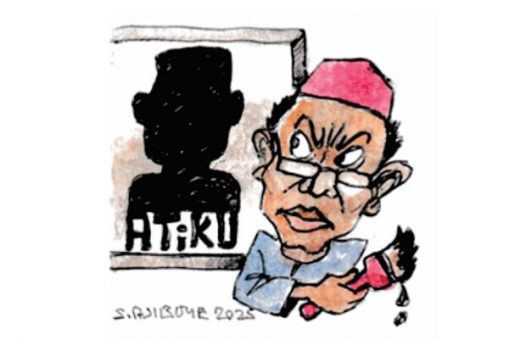Even for a politician as unprincipled and iconoclastic as former Kaduna State governor Nasir el-Rufai, reversing his damning characterisation of former Vice President Atiku Abubakar as a corrupt and shifty leader is a form of political self-immolation.
He may have stormed out of the ruling All Progressives Congress (APC) in a huff, leapt into the turbulent void of the Social Democratic Party (SDP) without scruples, and now perches half-heartedly on the litigation-afflicted African Democratic Congress (ADC). But for all his audacity, he is no fool when it comes to his private interest and political survival. Normally defiant on nearly every front, he is now unusually reticent about his SDP misadventure—a blind alley for which his usual inventiveness offers no cure.

At present, his wariness in the ADC likely stems from the caution born of his many recent political missteps. He will remain in this newly adopted, old, and overworn party, hoping first that it survives its legal labyrinth and second that he and other regicidal Young Turks can unseat the old guard represented by Alhaji Atiku, forging a new path with himself at the center.

Tactical Positioning
Former Osun State governor Rauf Aregbesola has been rallying the disgruntled in the Southwest, but if circumstances permit, el-Rufai will supplant him as the ADC’s brash, public face. He will be as voluble as he is truculent, a battering ram without the unflinching commitment that once marked his political battles. In recent weeks, he has spoken more about a broad coalition to unseat the APC than about the ADC itself—deliberately so, for he is not yet a formal member.
Notably, he has been careful not to throw all his weight behind Atiku. The contradictions of promoting a man he once savaged in blistering terms are proving difficult to live with. More troubling for him is the growing national mood against a northern presidential candidate in 2027. That realisation not only loosens any sense of duty to Atiku but also tempts him with the prospect of becoming a running mate to a southern contender—whether Peter Obi, whom many falsely believe commands six million “captive” votes from 2023, or Rotimi Amaechi, whose main political asset is his inflated ego.

Anxieties and Ambitions
Prematurely, el-Rufai has begun calculating his 2027 prospects, but two obstacles loom. First, he must decide how far to indulge his messianic ego and its megalomaniacal rhetoric, framing Nigeria’s choice as either himself and his amorphous party or the death and destruction he predicts under the APC. His son, Bashir, recently amplified this apocalyptic tone on X (Twitter), declaring that “a few certain people have to kpai (die)” for Nigeria to be great. El-Rufai has shown no inclination to rein in his son, being himself an advocate of chaos as a path to renewal.
Last week, he filled newspaper front pages with incendiary warnings that the APC is “dangerous to Nigeria’s future” and that its re-election would destroy national unity. For him, the next presidential race is “the fight of our lives.”

A Record of Division
El-Rufai thrives on incitement and often validates ethnic exceptionalism. Ethically unmoored, he brings disorder to every group he joins, especially when denied prominence. The odds of him appearing on any serious ticket in 2027 are slim: most northern minority groups detest him, Nigerian Christians deplore him, and political leaders view him as irreverent and disloyal. Any party giving him prominence risks alienation.
Atiku himself may now suspect double-dealing. After years spent skewering the former vice president during the Buhari era, el-Rufai may yet return to his earlier conclusions about Atiku. While the ADC currently revolves around Atiku’s ambition, the party’s younger faction may resist serving political antiquity, foreshadowing a titanic internal battle.

Words That Cannot Be Unsaid
In November 2016, el-Rufai issued an eight-point rebuttal to Atiku’s claim that he offered him Transcorp Hilton shares, denying any connection and then unleashing a volley of insults. He accused Atiku of failing to explain shady deals like the “Ericsson maneuver,” the Abuja water treatment plant contract, and the PTDF scandal. He mocked Atiku’s “obsession with marabouts,” questioned his integrity over U.S. Senate findings of $40 million in suspicious offshore transfers, and taunted him to “clear up such matters conclusively” if he truly coveted the presidency.
Some political statements can be walked back. These cannot. They damage Atiku and expose the malevolence of their speaker. El-Rufai knows there is no explaining away this portrait. It has taken Atiku’s defection to the ADC, plus years of miscalculation and failed presidential bids, to render Atiku politically embalmed. But in embalming Atiku, el-Rufai has also painted himself as an unprincipled and dysfunctional figure—his politics now visibly unravelling.




